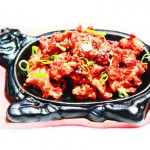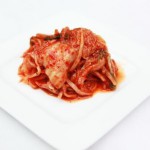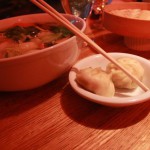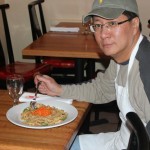- HOT SPOT: Tadashi Torii, a resident of Waynesville and native of Japan, in the bamboo grove beside Heiwa Shokudo Japanese restaurant on Lexington Avenue. Photo by Nick King
- NEW YEAR’S DINNER: Noodles and dumplings are often eaten to celebrate the Chinese New Year. Photo by Jesse Farthing
- NEW YEAR’S NOODLES: Alan Kong, owner of The Noodle Shop, says noodles one dish that is often served on the Chinese New Year. Photo by Jesse Farthing
For more than a thousand years, northern Asian cultures have beaten the harsh cold and brutal snow storms of winter with warming dishes such as steaming soups and stews, peppery kimchi, savory dumplings and spicy barbecue. Gathering with family and friends around the table to enjoy these foods is a cold-weather Asian tradition that has found its way to the Asheville area through its vibrant and varied community of residents who claim Japanese, Korean and Chinese roots.
Tadashi Torii, a glass artist who lives in Waynesville, says that two of his favorite traditional Japanese winter dishes are oden and mizutaki.
“Oden — that’s got a kelp soup base and you cut up a bunch of stuff and put in it: potatoes, daikon (a mild-flavored Asian radish) and, depending on where you are from in Japan, they may add either chicken or beef, tofu or dried fish,” Torii says. “It’s really great. I cooked it once, and my wife liked it so much that she ate it seven days in a row.”
As for mizutaki, “The ingredients are Chinese cabbage, regular tofu, green onions, shiitake mushrooms and carrots,” he says. “Then you can put in chicken or another meat and make a meatball with a little egg as a bonding agent. To spice it up, you can add pepper or garlic powder.”
Popular all over East Asia, hot pot dishes like mizutaki are traditionally cooked right at the table in a ceramic pot.
Scott Martz is an American who has been living and teaching in China for the past four years. He says that in China, people believe that “drinking or eating cold drinks is very bad for your health. So they actually only drink warm water during the winter. You can’t find an ice cube unless it’s at a fast-food joint.”
“They love to eat hot pot during the winter,” he says. “You can either have a spicy broth or just regular water, and they pretty much put whatever they want in it, but the meat is always thinly sliced. They put all kinds of vegetables in the hot pot — pretty much any kind you want; there’s no set meal.”
Soups and stews are also traditional winter dishes in Korea.
Kristina Im, owner and chef at Korean House in downtown Asheville, says Koreans like to eat “everything” in the wintertime, but the more traditional foods are soups like yuk gye jang and a stew called galbi jim.
“Yuk gye jang,” she explains, is “a soup with sweet potato noodles, a beef bone broth and a lot of vegetables. That’s one, with a spicy broth, that people like to eat when it gets cold. Also galbi jim — a short rib stew with a sweet broth, dates, pine nuts and radish, with a fruit sauce and ginger that makes your body warm up.”
Sj Yang, who works at Kim’s Oriental Food and Gifts, echos Im’s statement that they eat “everything” during the winter, Yang lists a variety of foods that Koreans enjoy, including kimchi, seafood soup and traditional Korean barbecue.
“In Korea there are lots of kinds of kimchi,” says Yang. “Radish kimchi, cabbage kimchi, white kimchi, water kimchi. Koreans love it, especially during the wintertime.”
“The end of January is the Lunar New Year, so the Korean people eat rice-cake soup generally,” he adds.
Duk mandu guk, Im explains, is rice cakes and dumplings with vegetables and a beef broth. “That’s a cultural thing. People think that after we eat that, we get one year older.”
With its diverse array of restaurants and shops, Asheville is home to a wide variety of places to experience traditional Asian winter foods. Heiwa Shokudo (87 N. Lexington Ave.), The Noodle Shop (3 Pack Square) and Korean House (122 College St.) are good places to begin. Home chefs looking to make these dishes should check out Foreign Affairs Oriental Market (611 Tunnel Road) or Kim’s Oriental Food and Gifts (5 Regent Park Blvd.) to stock up on ingredients that may not be available in traditional Western supermarkets.









Before you comment
The comments section is here to provide a platform for civil dialogue on the issues we face together as a local community. Xpress is committed to offering this platform for all voices, but when the tone of the discussion gets nasty or strays off topic, we believe many people choose not to participate. Xpress editors are determined to moderate comments to ensure a constructive interchange is maintained. All comments judged not to be in keeping with the spirit of civil discourse will be removed and repeat violators will be banned. See here for our terms of service. Thank you for being part of this effort to promote respectful discussion.